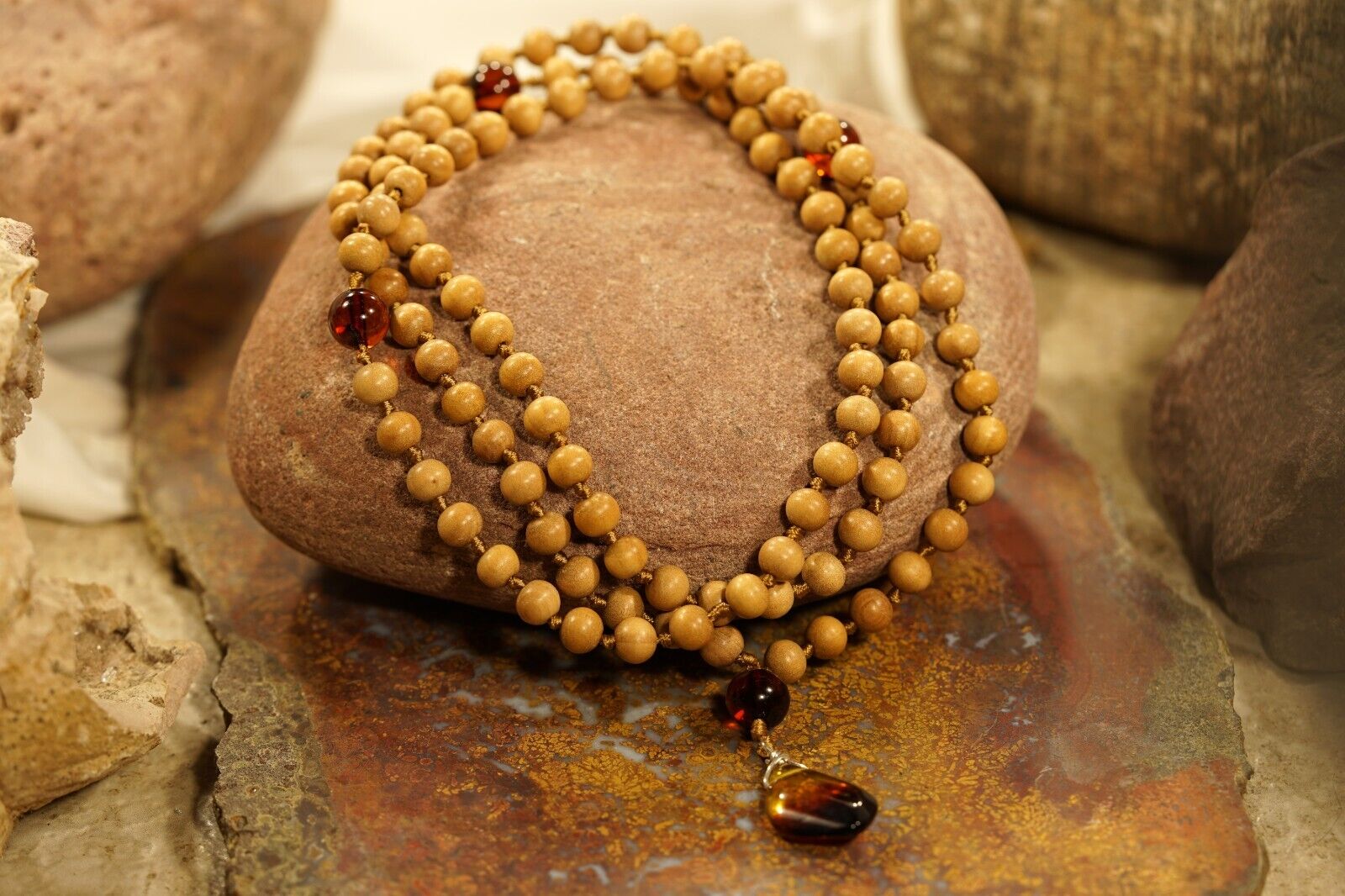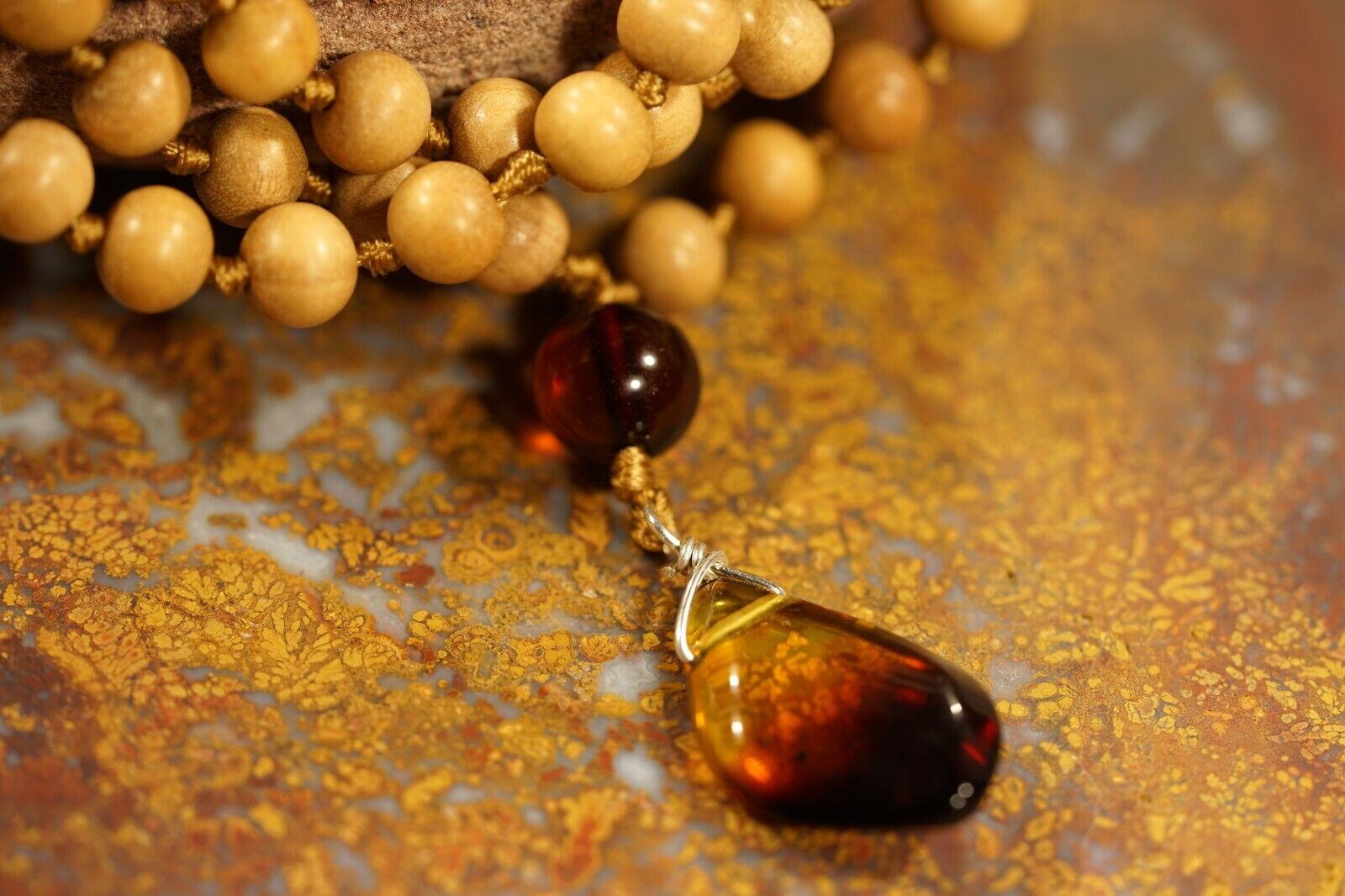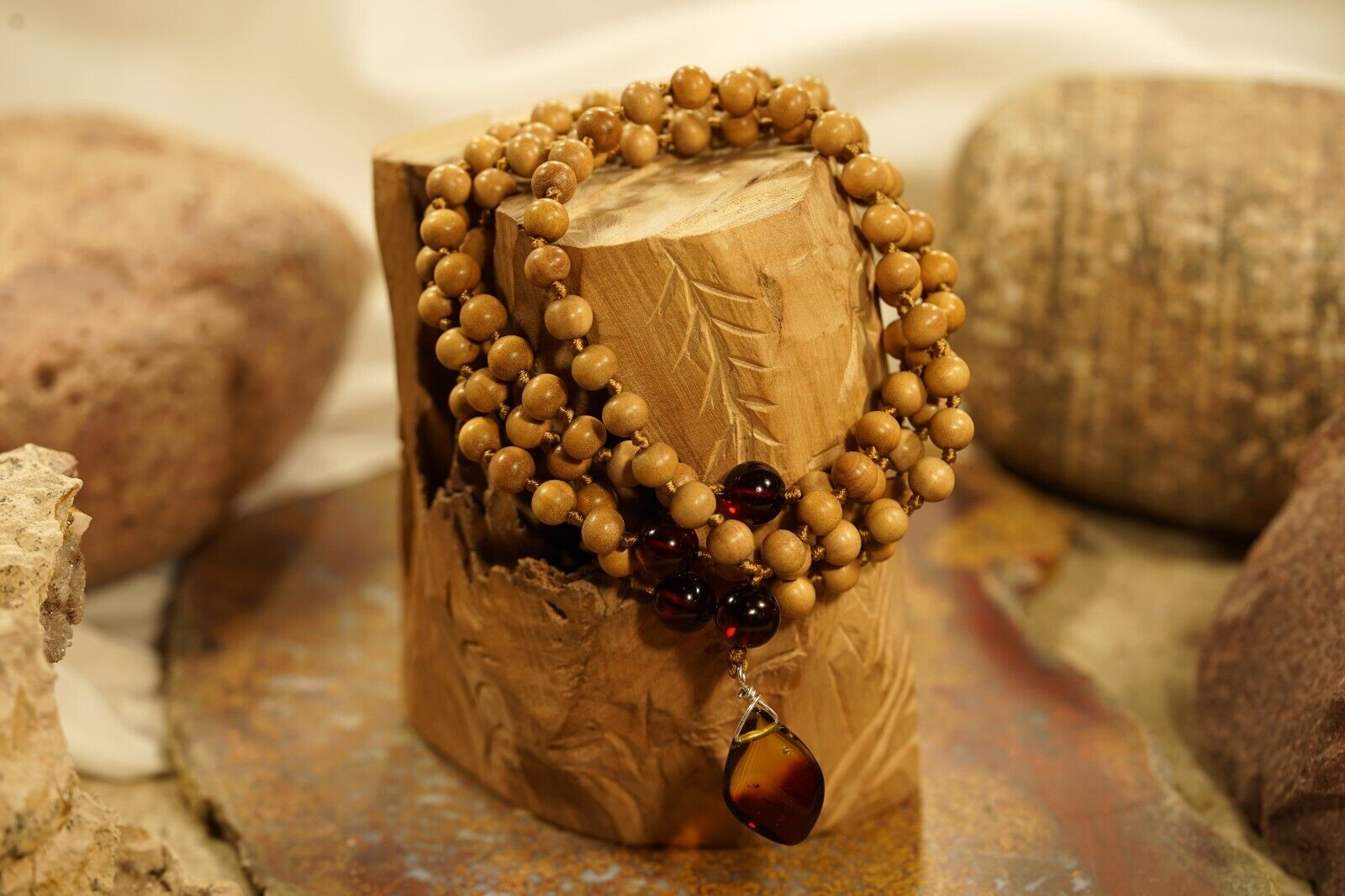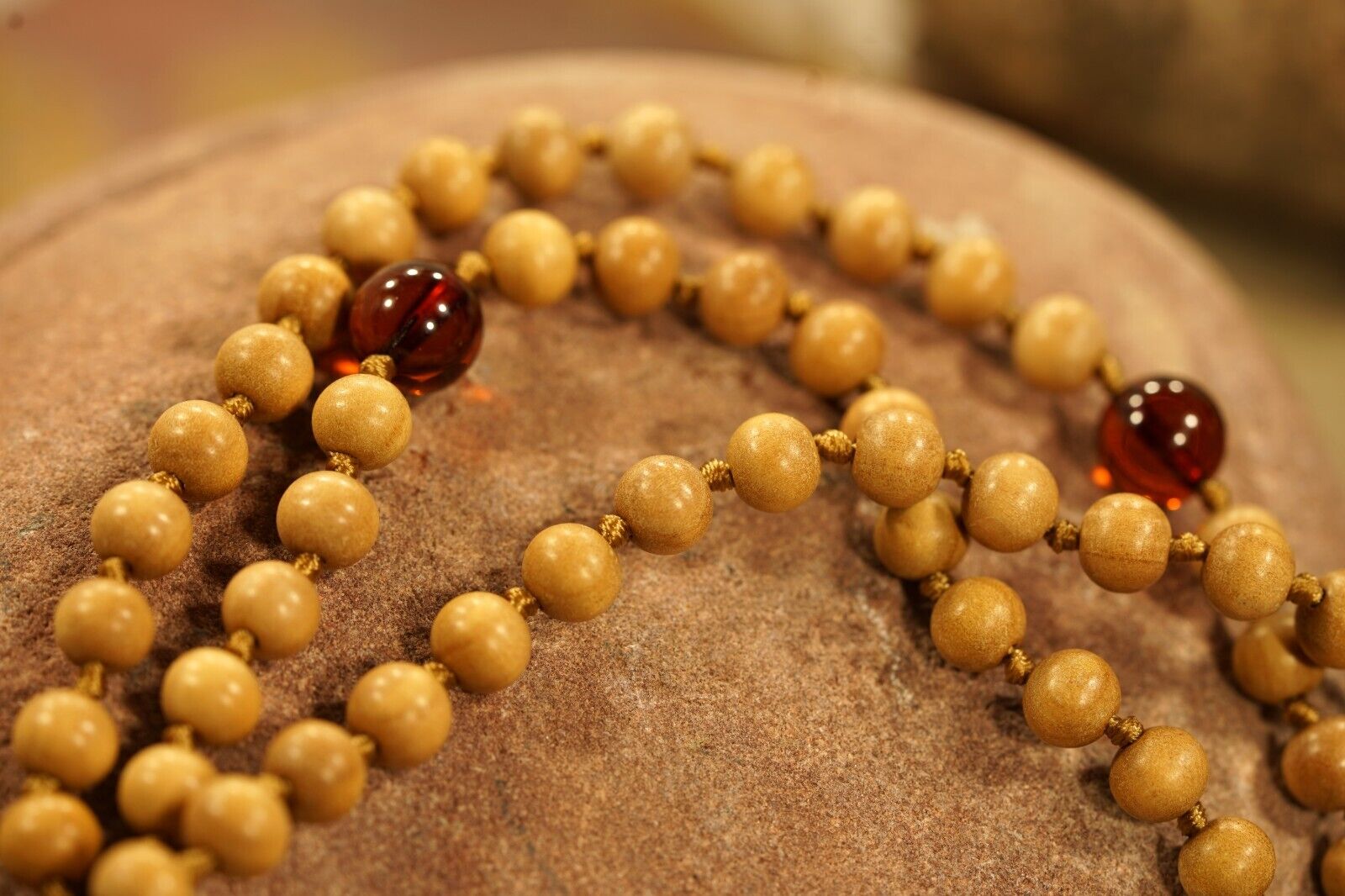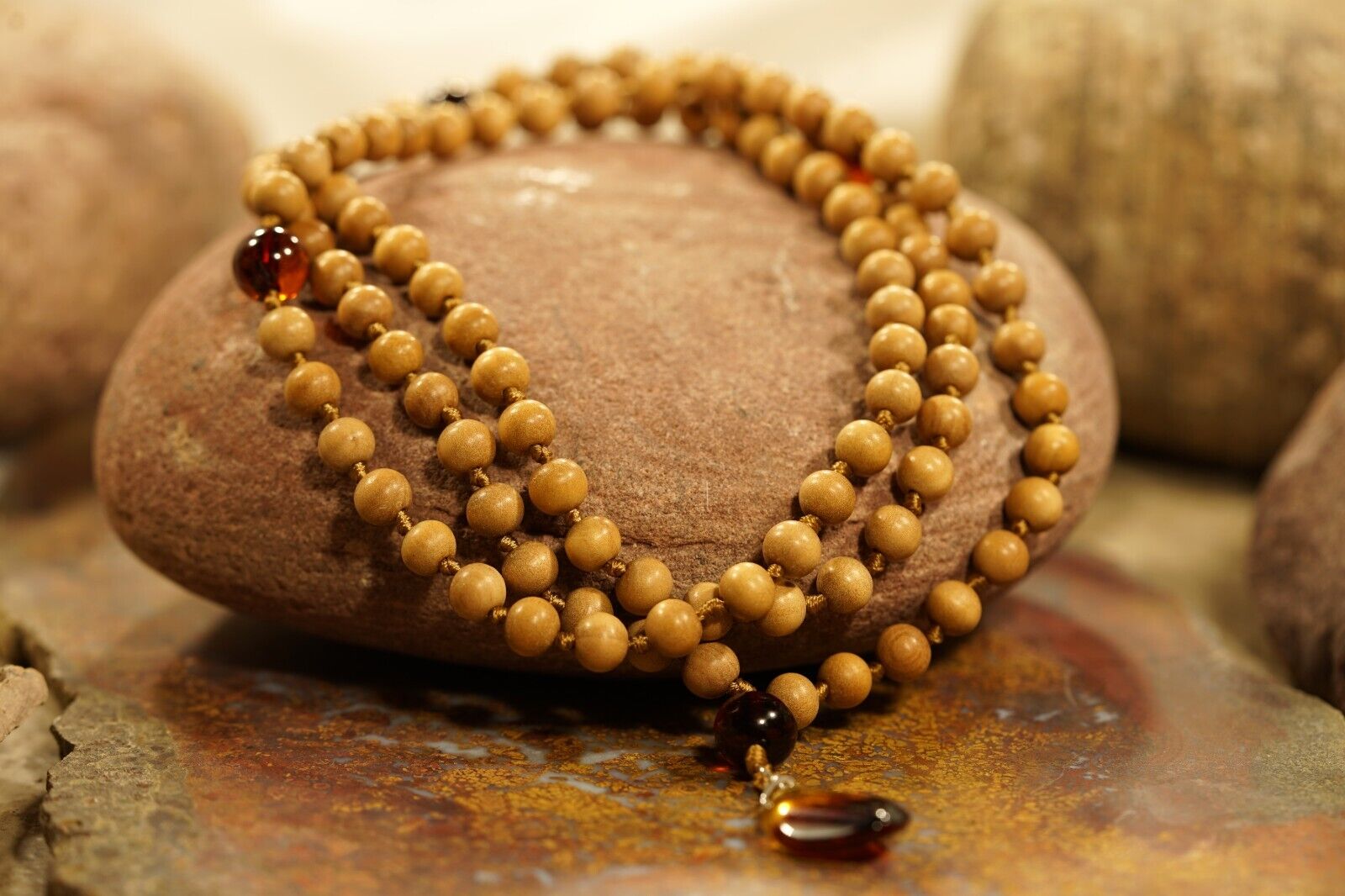-40%
Sandalwood Necklace • Baltic Amber • Mysore Sandalwood and Amber Mala • 6mm 3833
$ 60.72
- Description
- Size Guide
Description
Material : highest quality Mysore Sandalwood beads - 6mm and Baltic Amber Spacers and Pendant# of beads : 108+3+1
Spacers : 3 High Baltic Amber Beads
Pendant : Baltic Amber
Cord : Caramel Brown
Length : about 19in
Circumference : about 35in
Weight : about 16g
Treatment : all beads are natural
Please note that these are all one of a kind pieces. The mala pictured is the one you will receive. Every time a mala is sold we make a new one with different Magnesite and Sandalwood beads.
PRECAUTIONARY NOTE: our beads and all other Mysore Sandalwood products are NEVER scented. However, please keep in mind that we store all turned beads in sealed containers, and that the finished malas are shipped from Arizona, where the weather can get quite hot. All this leads to an intense concentration of the aroma when you initially open your package. It jumps out at you. This is a normal, temporary phenomenon. After a few days the intensity will weaken. In its regular state Sandalwood emits a delicate fragrance. It will emit this fragrance for a very long time.
From time to time I am asked why the price of our Sandalwood is so high, and if I can offer a discount.
In reality the price is very cheap.
One can buy a thousand sandalwood malas and still not have a Sandalwood mala. Sandalwood, more than Turquoise, Italian Coral, etc..., is by far the most imitated bead in the world, and to complicate things even further it is much harder to distinguish the copy from the original.
The reason for this is two-fold.
First of all, there are other woods that mimic the grain and/or the color of Sandalwood and the artificial sandalwood fragrance is cheap and impossible, for an average nose, to distinguish from authentic Sandalwood Oil. The only way to know if you have the real thing is to wait a few weeks till the fragrance evaporates.
Secondly, due to the years of deception, most retailers and probably some wholesalers, cannot distinguish real South Indian Sandalwood from the numerous imitations. I will include Australian Sandalwood in this group.
All our beads are procured through official sources in the state of Karnataka, the largest producer of the highest quality Authentic Sandalwood and Sandalwood Oil in the world. The production in the state of Karnataka is closely controlled by the gov't and addresses environmental concerns surrounding the growth and cultivation of these magnificent trees.
As a side note, if taken care of properly, these beads will emit an aroma during their lifetime. You might even be able to pass them to your children. I have beads which were turned over a hundred years ago, and some from the time when I began working with Sandalwood about 20 years back. They both smell like new.
Also please note, in regards to discounts, that these beads are never on sale.
Original South Indian Sandalwood has been prized throughout the millennia for its gentle, unique and uplifting aroma. Its heavenward striving scent is said to be the favored by all the Gods.
Among its numerous properties Sandalwood is recommended for:
• Materializing our prayers, intentions and wishes
• Awakening spiritual awareness
• Cultivating mental alertness and mindful meditation
• Restful sleep
• Uplifting our spirits and clearing away the sadness, stress, nervous tension and anxiety
• Cooling excessive heat in all of its manifestations
• Promoting compassion and empathy
• Controlling anger and aggression
The question of HOW TO CARE FOR YOUR SANDALWOOD pieces is worth exploring.
Sandalwood is a delicate, organic substance that interacts with its environment.
Sandalwood malas and jewelry have two natural enemies: our sweat and environmental pollutants. Both of these factors deposit dirt, minerals and other impurities on the surface of the beads. These foreign elements ingrain themselves in the porous wood and build a shield around it, blocking the natural in- and out-breathing process of the wood and the liberation of its inherent fragrance.
To rejuvenate your pieces when they start showing fatigue from wear, we strongly encourage placing them in a small plastic container or a zip lock bag that contains some Sandalwood powder, and leaving them there as long as possible. The powder will readily share some of its essence with the tired beads, and alleviate the load of accumulated impurities.. This is an excellent method of fully optimizing the potential of your beads.
We offer Sandalwood powder here:
https://www.etsy.com/listing/868868340/natural-mysore-sandalwood-powder-pure?ref=shop_home_active_34
Tibetan/Mahayana style mala, without the knots. Can be worn as a necklace or a wrap bracelet.
Please note that you are buying a GENUINE SANDALWOOD product from the jungles of Karnataka. The trees that grow in the Mysore region of Karnataka have long been considered as the source of the best sandalwood in the world. Karnataka sandalwood was, and still is, the preferred choice for religious ritual, artistic and architectural needs of Hindu and Buddhist traditions and above all Chinese consumers, who are the force behind recent increase in prices.
Due to a spike in demand, and scarcity of raw materials, the price of authentic sandalwood has skyrocketed. This lead to an ever-evolving selection of alternatives and substitutes, which are unfortunately more often than not sold under the name of sandalwood.
We carry two such woods Nagar Chand Sandal, and Kadam Sandal.
If you are still reading this, it probably indicates that you are very interested in Sandalwood. So I will indulge your attention a bit further and explain one of the most common misconceptions about this wood.
There is a belief among some of our customers that dark colored Sandalwood is of higher quality than the lighter tones. This belief is especially prevalent among our Chinese clients. I still have not been able to pinpoint its source, but presume it originated in China. I think the confusion starts from the fact that Sandalwood darkens with age. But this only applies to cut wood. So for example my beads from 20 years ago are much darker than the beads turned this year, even though originally they looked exactly the same.
Living wood retains the same color during the life span of a tree. Once the tree cut, the wood will darken.
The color of fresh wood depends on one factor, and one factor only, the soil and its mineral content.
So while there is a handful of shades found in freshly cut wood, ranging from brown to light yellow, the only thing that the color is indicative of its the approximate geographical location of the source tree.
As a side note, sometime back tests were run on different color sandalwoods to determine if there was any correlation between color and sandal oil content. To the surprise of many, the light, yellow wood had the highest oil content.
